
An increase of lysosomes, cellular garbage collectors, leads to an increase in amyloid plaques (green and red). Credit: Yale University
New research from Yale University shows that increased lysosomes in neural projections in a mouse model of Alzheimer’s greatly accelerated the formation of amyloid plaques.
Lysosomes are cellular sanitation engineers that help clean up and recycle internal debris no longer needed by cells. So why do researchers find so many lysosomes within the neuronal projections surrounding amyloid plaques, a hallmark of Alzheimer’s Disease brain pathology?
“We didn’t know whether these accumulations of lysosomes represented a beneficial response of neurons to the amyloid plaque disease pathology or whether they were somehow deleterious,” said Shawn Ferguson, associate professor of cell biology at Yale.
Ferguson and colleagues investigated how neurons control the distribution of lysosomes and used the knowledge to increase lysosomes in neural projections in a mouse model of Alzheimer’s. They found that the additional lysosomes greatly accelerated the formation of amyloid plaques. The findings suggest that reducing the build-up of lysosomes within neurons might be a novel way to treat dementia, said the researchers.
The research was published on August 7 in the Journal of Cell Biology.
Reference: “Impaired JIP3-dependent axonal lysosome transport promotes amyloid plaque pathology” by Swetha Gowrishankar, Yumei Wu and Shawn M. Ferguson, 7 August 2017, Journal of Cell Biology.
DOI: 10.1083/jcb.201612148
Abstract: Lysosomes robustly accumulate within axonal swellings at Alzheimer’s disease (AD) amyloid plaques. However, the underlying mechanisms and disease relevance of such lysosome accumulations are not well understood. Motivated by these problems, we identified JNK-interacting protein 3 (JIP3) as an important regulator of axonal lysosome transport and maturation. JIP3 knockout mouse neuron primary cultures accumulate lysosomes within focal axonal swellings that resemble the dystrophic axons at amyloid plaques. These swellings contain high levels of amyloid precursor protein processing enzymes (BACE1 and presenilin 2) and are accompanied by elevated Aβ peptide levels. The in vivo importance of the JIP3-dependent regulation of axonal lysosomes was revealed by the worsening of the amyloid plaque pathology arising from JIP3 haploinsufficiency in a mouse model of AD. These results establish the critical role of JIP3-dependent axonal lysosome transport in regulating amyloidogenic amyloid precursor protein processing and support a model wherein Aβ production is amplified by plaque-induced axonal lysosome transport defects.

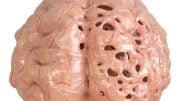
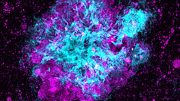
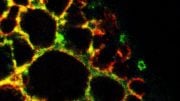
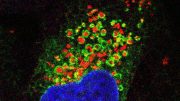

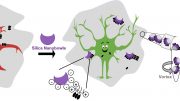
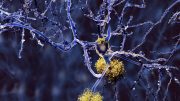
I’m very interested in your study. My grandmother died of alzheimers and my sister has early onset. Please feel free to share any new information re alzheimers research. Thank you